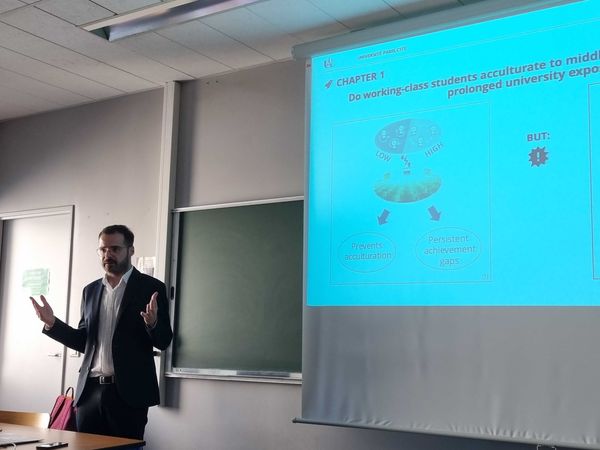Closing The Achievement Gap: Learning from Working-Class Students’ Acculturation and Success in Higher Education
Thèse dirigée par Rasyid Bo Sanitioso et Sébastien Goudeau
Soutenance le jeudi 25 mai 2023 à 10h en salle 2010
Résumé :
Upward educational mobility is a persistent challenge in many countries. One contributing factor may be the cultural mismatch experienced by working-class students in higher education. These students often hold interdependent norms that clash with the independent cultural norms prevalent in universities, potentially leading to lower academic success. Through a combination of longitudinal studies, experimental studies, and correlational research, the present work sheds light on the complex dynamics of working-class students’ cultural mismatch and acculturation, throughout the students’ university experiences. The research aims to enhance our understanding of the experiences and challenges faced by working-class students and ultimately to inform policy and practice in higher education to support their success. Chapter 1 presents longitudinal studies (N = 1357) which reveal that despite prolonged exposure to the university environment, social-class differences persist as working-class students often struggle to navigate and acculturate to the middle/upper-class norms that dominate higher education institutions. However, by analyzing the experiences of successful working-class students in studies presented in Chapter 2 (N = 1217), and the impact of the COVID-19 pandemic in another study in Chapter 3 (N = 2275), as well as factors that affect working-class students’ acculturation, the research identifies strategies and resources that some working-class students used to overcome barriers and achieve academic success. These include integrating independent norms into their identity, flexibly acculturating to the demands of university life, and reducing cultural mismatch. The present findings highlight the unique challenges faced by working-class students and underscore the responsibility of universities to take action in reducing social-class achievement gaps. To support their success, institutions must provide a supportive environment and tailored interventions, and value interdependence more than they do now. These actions can interrupt the pattern of cultural mismatch and potentially enable genuine upward social mobility.

À lire aussi
Julien Barbedor (Université Catholique de Louvain) : “Décomposer la structure de la perception sociale selon le juge, la cible et les relations intergroupes”
Lundi 9 février en salle du Conseil © Résumé du séminaire : La perception sociale, entendue comme notre capacité à percevoir et évaluer autrui, constitue un élément central du fonctionnement humain. Elle ne se limite pas à observer le monde : elle contribue à le...
Vers des politiques publiques environnementales plus justes socialement : Livrable de fin de contrat Cifre d’Ellora Frémaux Miguel
Découvrez le livrable de fin de thèse d'Ellora Frémaux Miguel réalisé en collaboration avec la ville de Paris : Vers des politiques publiques environnementales plus justes socialement © Thèse : Perception de justice et acceptabilité des politiques publiques...
Mike Duggan (King’s College London) : What Are Maps? How Maps Shape Us And Society… And Why Social Psychologists Should Care
Mercredi 17 décembre 2025 à 14h30 en salle du Conseil © Résumé : Maps go far beyond just showing us where things are located. In this talk, I will explore how maps impact our lives on social and cultural levels. Through examining maps from a history up to the present...
Soutenance de thèse de Acintya Ratna Priwati
Lundi 15 décembre 2025 en visioconférence © Titre : Cross-Cultural and Social Identity Theory Perspectives on National Identity: Definition, Identification, Collective Memory and Collective Future Thinking À lire aussi
